By the time this is published, Prof Okello Oculi would have been interned in Abuja Nigeria, far away from his village of birth in Uganda but in the capital city of the black world. It is debatable if anything else would have been more pleasing for someone like Prof Oculi who decided quite early on his scale of commitment to the African cause. And who executed it against all odds to the point that got his academic colleagues to breakdown at the ‘Service of Songs’ marking his transition. At each of the final rites of passage, all the barriers crashed as ethnic, religious, class, national, generational and gender walls gave way to just humanity.
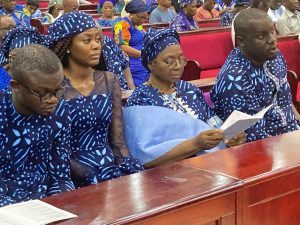
Prof Oculi’s family at the ‘Service of Songs’
At that same event on August 21st, 2025, there were others who manifested no emotional breakdown but are deeply heartbroken that physical contact with Oculi has been permanently severed. It was there in Jennifer Ejembi Emdin’s and her other friends who were classmates of Prof Oculi’s widow, Debra Ogazuma at Saint Faith Secondary School, now Government Girls Secondary School, Kawo; Prof I. E. S Amdi, another ex-ABU, Zaria political science colleague of Oculi; Dr Edwin Bako; Prof and Mrs Jerry Gana, an ex-Nigerian minister and ex-colleague of Oculi in Zaria and too many more others.
And all these for someone who was never a president or prime minister, a Senator or minister of the Federal Republic. Oculi’s intellectual exploits, his pedagogical tactics for deploying them and his investments in fabricating the agency that will carry on the counter-hegemonic burden produced his elevation to the status of the quintessential spokesperson for a historically degraded continent and the politics of overcoming degradation.
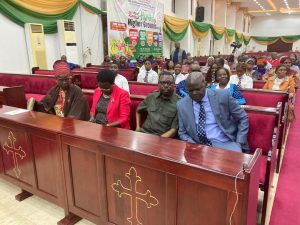
Some members of the Ugandan delegation
But his death came at a time of deaths. Prof Valentin-Yves Mudimbe started it all. In late April, the Congolese philosopher passed on. Prof Ngugi wa Thiongo followed him in a space of a month. Then Okello Oculi followed on July 26th. It was as if they decided to leave at the same time because, within a space of three months, three stalwarts of the ‘never say die’ cadre of Pan-Africanists are, physically, gone. It is true they left enough to keep whispering into the ears of their successors how the protest tradition is carried out. Prof Okello Oculi probably took that tradition to higher heights by creating a core of youngsters who speak to the possibility of replicability. So, he anticipated and responded in his own way to the challenges of continuity, all things being equal.
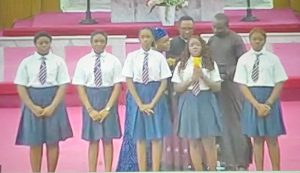
One set of eaglet Pan-Africanists
The performance and the message to the ‘Service of Songs’ from pupils of two different secondary schools where Prof Okello’s Pan-Africa Club was functional has been very encouraging. One of them said their training under Prof Okello was such that there is no audience they could not address, no matter how large. That is what the Okello grooming can do to even a teenager.
There was also the Poem read at the ‘Service of Songs’ on August 21, 2025. It was by Prof. Okaka Opio Dokotum, the Deputy Vice-Chancellor (Academics) of Lira University in Uganda. Prof Dokotum is part of the symbolically thick representation from Uganda at Prof Okello’s burial in Abuja, Nigeria. Scheduled for publication, the poem sends the message that the continent is probably only not unleashing all its arsenals at extraversion. Otherwise, it has all the philosophical, literary and ideological weapons of mass destruction against historical expropriation.
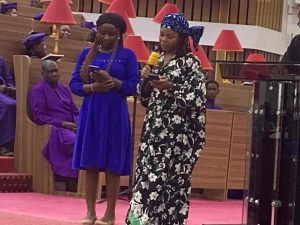
Another set of Pan-African Club graduates testifying
And that heightens the question of the immediate successors of the voices such as Mudimbe, Ngugi and Okello Oculi whose own voice, individually and collectively, have earned Africa the little respect grudgingly accorded it, ‘from Hegel to Huntington’, to reference the slogan thereto. Who is replacing them?
It is a question worth pursuing because, before the current spate of death, a number of the leading postcolonial voices had taken their leave. If we must illustrate this, that would include Fanon, Chinua Achebe, Ali Mazrui, Edward Said (Africa by theoretical solidarity because his framework of ‘imaginative geographies’ addresses more of the African experience than it does the Eastern/Arab/Palestinian crisis except probably its current explosion).
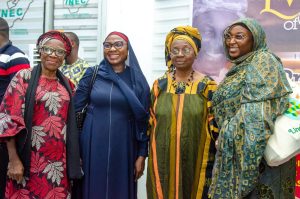
Powerful solidarity!
By current level of scientific and technological development, there is no stopping the death of some persons once a certain age is reached. Certainly, there were a number of them who could have lived longer. Science or no science, death is that reality next door for all, young and old. And it makes successors a subject of permanent interest, particularly in this context.
Where are the potential successors of the Mudimbes, Ngugis and Okello Oculis hiding, particularly in literature, the arts or humanities, broadly? US based Kenyan cultural scholar, Prof Simon Gikandi, is accomplished and well located in academia. He is an archetype of the established voice. As a theorist of culture and cultural production, he can strike deadly blows on both Hegel and Huntington and all the others who derided Africa and Africans (Kant, Hume, Rousseau and so on). The only problem is whether he is, by orientation, inclined to the bolekeja Afrocentric ideological tussle with Hegel’s ancestors. One only has a distant reading of him.
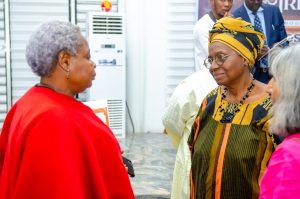
Together we face it
Ironically, Okello would support him. Okello would endorse any tactics that balanced a subaltern’s power against that of Hegel’s ancestors. Power was the only unchanging variable in the Okello gaze on the world. Those who reduce his theatre of unfolding to Pan-Africanism may not be wrong because that was the domain he manifested most. But power was still the undercurrent driving that. But it is impossible to theorise Okello’s perspective of power. He wasn’t a Realist of any hue. He wasn’t that kind of Marxist either. And he dismissed any variant of postmodernism, calling it a science of silence. It seemed he was for ever wrestling with an ideological grounding. One site of that wrestling was his theory of Ka-Maat (See, for example, his 1989 essay “Ancient Egypt And Africa’s Search for Ka-Maat”). It is most likely that the prevalence of orthodox Marxism in ABU, Zaria in those days made the place a hostile ground for developing the Ka-Maat idea further.
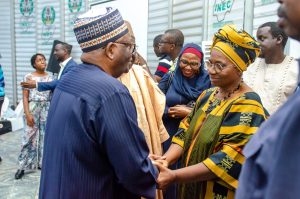
Prof Gambari with Prof Oculi’s widow
There is a way Prof Oculi is comparable to Jacques Derrida whose own was how power denied him of identity at every turn in his life, leading him to develop his theory of Deconstruction, a powerful insight into how power is all that counts and where power comes from. Derrida could neither be a French, a Jew, an Arab or an African for any consistent length of time until power liberated him. The same experience of colonialism that fragmented Derrida at every turn applied to Oculi. Why he, like most senior African academics, dismissed poststructuralism is one of the puzzles for younger elements to research and unravel.
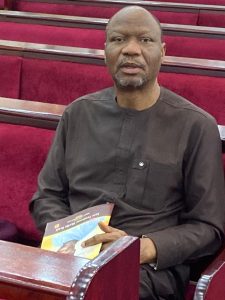
Former student in solidarity
I asked Mallam Y Z Yáu, the Executive Director of Kano based Centre for Information Technology and Development (CITAD) recently why many senior African academics allege Eurocentrism against postcolonial, poststructural and decolonial theory when that is what their actions affirm. He said something I am still wondering why those of us who have been reading poststructuralist stuff have not thought about. Two months later, ex-Action Aid Country Director for Nigeria, Comrade Ene Obi sent me a text using an expression that said something similar to Mallam Y. Z’s even though she had no idea that there was any such thing on the ground from Mallam. So, why are those on the barricades confirming what the mainly academic actors are denying? Anyway, that is probably a question for another day. Today is Prof Oculi’s burial.
Other than Prof Gikandi, there is a concentration in South Africa that compels looking in that direction. Prof Ndlovu-Gatsheni is a particularly angry voice. The title of his academic battles point in that direction. But, this is also a distant reading. Prof Achille Mbembe is well positioned. Whether he has managed the African audience as to make rapid progress in taking up more than he has already done about articulating Africa is open to speculation. But he seems to be more aware of voice as a power resource in always saying that Africa must come to terms with the imperative of converting facts or statistics to signs. That says a lot about how far he is into the language – power nexus and the Africa’s struggle for emancipation.
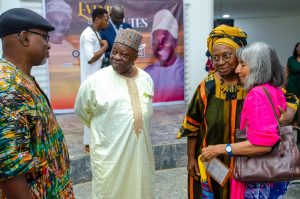
(L-R) A relation of Mrs Oculi, Prof Jibo Ibrahim, Mrs Debra Ogazuma and Dr Chermaine Peirera
So, could Achille Mbembe become the African voice of the age or is it Sabelo Ndlovu- Gatsheni or Nigeria’s Adebayo Olukoshi? Apart from versatility, Prof Olukoshi has the extra advantage of schooling under Oculi at the Ahmadu Bello University, Zaria when Okello was freshest.
There are quite a number of voices scattered around the continent and the diaspora. Not all of them come to mind immediately. It is also not all of them who have been that vocal. But they are certainly there in the major metatheoretical fronts shaping voice in the post-Cold War.
Intervention will, therefore, keep updating the list and watching the progression in the politics of voice because voice is all that Africa has got in terms of the power resource that can still unmake the past.
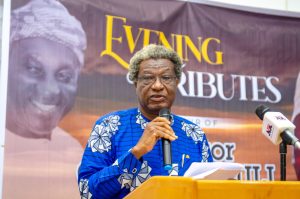
Literary and family friend of Prof
It is one thing for Africa or any continent to be awash with strategic natural resources but still held down by the discursive power of those who have mastered that approach to acquisition and consolidation of power. The global endorsement of Okello Oculi’s life is our latest and most solid evidence in favour of the power of discursive power. And the African tragedy at this point in time might just be in the poverty of current academic engagement with how discursive power is produced and how it counters hegemonic scripts, that being what enabled literary arts, particularly the novel, to achieve for Africa the little recovery the continent has managed to achieve.
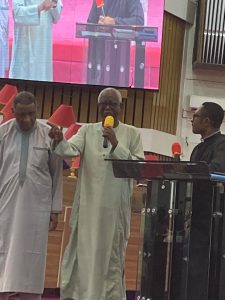
Dr Abubakar Siddique Mohammed and Prof Alkassum Abba, all of ABU, Zaria of Okello’s time
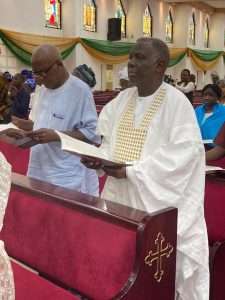
Former minister of Information, Prof Jerry Gana
It makes it all the more interesting why none of the leading voices in the counter-hegemonic narrativisation of empire and colonialism have never won the Nobel Prize in Literature. Could that be a coincidence or a coded message from the Nobel establishment? Except if that establishment makes posthumous awards to the Achebes and Ngugis and Okellos which can edit that impression or the perception will persist. This is more so that the Nobel establishment is seen to be standing shoulder to shoulder with the IMF and the World Bank in their instruction to Africa to encourage science and discourage liberal (and liberating) education. What an astonishing binarism!
+Script by Adagbo Onoja while Comrade John Odah, Dr Dauda Garuba and Farida Lukman contributed to this reporting through many of the pictures for the series of reporting on Prof Oculi’s transition process in the past 3-days which they made available.




























